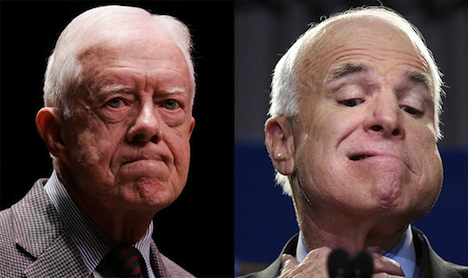If you thought the idea of Russian president Vladimir Putin’s op-ed in The New York Times was insufferable, don’t worry, comrades — US senator John McCain of Arizona is coming soon to a Pravda newsstand near you.![]()
![]()
![]()
Typically, US foreign policy is conducted at a very concentrated level among a top coterie of constitutional officers and White House staffers. The 535-member US Congress likes to get in on the act too, from time to time, just as it did when US president Barack Obama called for a congressional vote on potential military action against Bashar al-Assad in punishment for his regime’s use of chemical warfare on August 21.
But sometimes, there are free agents who, by benefit of their success in public life, can conduct a virtual shadow foreign policy. For over three decades, the most exceptional example has been former president Jimmy Carter, whose post-presidential diplomacy has caused fits for many of his successors in the Oval Office, including Democrats like Obama and Bill Clinton as well as Republicans like George W. Bush.
But even before his failed 2008 presidential run, McCain has increasingly become another Jimmy Carter — in his willingness to engage in shadow diplomacy, often to the dismay of both the Bush and Obama administrations. Except Carter is liberal and dovish and McCain is conservative and hawkish.
Carter honed his approach as a mercenary-for-peace in the 1990s, when he attempted to use his special status as a former US president to broker peace everywhere from Haiti to Sudan. He visited Cuban president Fidel Castro in 2002, despite the fact that US-Cuban relations have been strained since the 1959 Cuban revolution and the 1963 missile crisis, and he endorsed the electoral process in Venezuela’s 2004 recall election that kept Hugo Chávez, another anti-American leader, in office. Carter spoke out early and often against the Bush administration’s push to invade Iraq in 2003 to a rare degree among former US presidents, and he remained a critic of the Bush administration’s Iraq policy throughout the 2000s. Carter, most recently, has criticized the Obama administration for the use of unmanned drones in Pakistan, Yemen and elsewhere, and for keeping the Guantánamo Bay prison open for detainees suspected of terrorism.
You might think that Carter’s approach is a brilliant way to nudge US foreign policy toward more peaceful outcomes — he won the 2002 Nobel Peace Prize largely on the basis of his post-presidential work. But you might also think that Carter’s approach complicates often delicate situations by introducing another (unwelcome) cook to the kitchen, and Carter’s diplomacy typically causes more frustration than enthusiasm from within the White House.
Likewise, the Obama administration won’t welcome McCain’s latest move, which will raise the decibel level with what’s certainly likely to be a provocative Pravda piece. It comes two days after McCain saw the need to release his own statement about Moscow’s mayoral elections. (Isn’t that the U.S. state department’s job rather than the ranking member of the US Senate’s armed services committee?)
Neither Carter nor McCain would exactly welcome the comparison — Carter said during the 2008 election campaign that McCain was ‘milking every possible drop of advantage’ from his military record as a prisoner of war in Vietnam, and McCain a year later called Carter the worst president of the 20th century. Continue reading John McCain is the Jimmy Carter of the right: a free radical running his own shadow diplomacy
